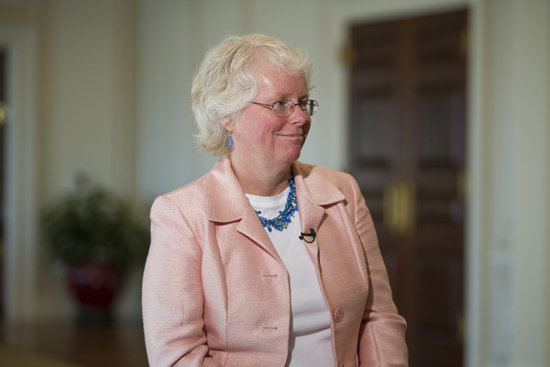Part-Time Faculty Will Vote on Unionization in January
Provost says move is not in best interests of students or faculty

From January 13 to January 30, some part-time faculty will vote in a mail-in ballot on whether to be represented by the Service Employees International Union. Photo courtesy of CentralMassAficio.org
Eligible part-time faculty at Boston University will vote in January on whether to be represented by the Service Employees International Union (SEIU). The election date was set on Wednesday by the National Labor Relations Board (NLRB), two weeks after the union filed a petition indicating that it had a sufficient showing of interest from part-time faculty for the board to conduct an election. Ballots for the election will be mailed at 5 p.m. on January 13 and must be returned no later than January 30. The outcome of the secret ballot, mail-in election will be determined by a simple majority of those part-time faculty who return their ballots.
The NLRB has determined that those included in the unit and eligible to vote will consist of part-time faculty in all schools and colleges, except for the School of Dental Medicine and the School of Medicine, although it includes the Division of Graduate Medical Sciences. The unit includes part-time faculty who are paid on a per-course or per-hour basis and who teach at least one credit-bearing course in a degree-granting program.
The unit will not include full-time faculty, whether tenured, tenure-track, or on contracts. It also excludes visiting faculty, graduate assistants, faculty who teach only online or who teach at campuses outside Massachusetts, a variety of administrators, and athletics coaches.
As required by the NLRB’s procedures, the University provided the NLRB with a list of 738 part-time faculty teaching in fall 2014 who fit this definition, and the NLRB determined that at least one-third of those individuals had signed authorization cards indicating their desire for a secret ballot election.
In recent months, part-time faculty demanding better pay and benefits have pushed for unionization at colleges and universities across the country.
Dan Hunter, a member of BU’s part-time faculty organizing committee and a College of Arts & Sciences lecturer in playwriting, sees the election as one step in an ongoing process of defining adjuncts’ role in higher education.
“I think this is a healthy move, and a strong institution should thrive with healthy debate,” says Hunter (GRS’98), who is also a Metropolitan College lecturer in the arts administration program. “I am doing this because I think it’s best for BU. The University needs to focus on what happens in the classroom. That’s where education occurs.”
But University officials oppose the move, saying unionization won’t result in better education for students and that they are better able to meet the needs of BU’s adjunct faculty.
“We believe it is important that members of our community become well educated about the potential consequences of union organization of our part-time faculty,” Jean Morrison, University provost and chief academic officer, wrote in a memo sent October 30 to all faculty and staff. “It is our position that using the collective bargaining process to establish and monitor the working conditions of our part-time faculty is not in the best interests of our students or faculty as a whole, and that a unionized part-time faculty will not be able to provide a better education for our students.”

Julie Sandell, associate provost for faculty affairs, says the University has been working to identify and implement changes to improve conditions for adjunct professors since well before union organizers became involved. “We are committed to continuing that process,” says Sandell. “We believe that it is more responsive to our adjunct faculty than the one offered by a union.”
Morrison has concerns about several changes that may come with unionization. She believes the union’s one-size-fits-all approach to problem solving is unlikely to meet the diverse needs of BU’s adjunct workforce. “BU part-time faculty represent a wide range of academic disciplines,” she says. “They are paid a competitive wage based on the demands of that discipline. In contrast, the union treats all adjuncts as a single unit, so many adjuncts in the bargaining unit stand to lose as much as others gain.”
She also is concerned that union constraints on hiring would make it difficult to hire the best part-time faculty, and that union rules, such as seniority, might supersede an applicant’s qualifications. She says the relationship between a faculty member and his or her departmental colleagues is critical, and she is apprehensive that a union contract could seriously damage that relationship.
“We recognize and respect the rights of our part-time faculty to consider and vote on unionization,” says Morrison. “At the same time, we are compelled to share our opposition to those efforts. Improved working conditions, building trust, and contributing to the educational well-being of the institution are all critically important goals, and it is our belief that interposing a union between part-time faculty and the institution hurts rather than helps us achieve those goals.”
On October 27, Tufts part-time faculty became the first at a local institution to approve a contract. Their new agreement grants a 22 percent pay raise over the next three years, and for those who teach three or more courses over the academic year, access to health, retirement, tuition reimbursement, and other employee benefits.
Part-time faculty at Northeastern and Lesley Universities also have voted to unionize in recent months, and similar campaigns are under way at Bentley University and Simmons College.
Hunter says it’s time to stop thinking of a BU adjunct faculty member as some “young postgrad stepping in for a brief period of time.
“These are people who are trying to cobble together a living at one university or a couple of them,” he says. “They are single mothers, people who have college debt, and—bear in mind—they have to have the same credentials and are held to the same standards as full-time faculty.”
But Sandell says the majority of BU’s part-time faculty have full-time jobs someplace else. “They teach for the intellectual engagement or to supplement their primary income,” she says, “and in a smaller number of cases they may be cobbling together a living with part-time teaching because they have not been able to secure a full-time academic position here or elsewhere.”
Sandell, who is also a School of Medicine professor of anatomy and neurobiology, says that only 16 percent of undergraduate courses this fall at BU are taught by part-time faculty. She says that number drops to 9 percent in CAS, which is the University’s largest school and where undergraduates from all its schools and colleges receive their core teaching. The percentage of courses taught by part-time faculty increases in schools where students are well served by learning from practitioners as well as full-time faculty, such as the School of Law, the School of Management, and the College of Communication. But even in SMG and COM, says Sandell, the overwhelming majority of courses are taught by full-time professors.
Morrison also noted that in October 2013, the University convened a group of part-time and full-time faculty and administrators who were asked to develop specific recommendations about the concerns of part-time faculty. The group worked throughout last fall and presented 37 recommendations covering a range of issues, from wages and benefits to working conditions and participation in the life of the institution.
The working group’s recommendations regarding health care benefits was an important consideration in the recent decision to extend health benefits to half-timers, and the group’s call for regular market analysis of part-time faculty salaries resulted in several broad adjustments in the regular budget cycle last year, including an increase for over 100 COM part-time faculty.
Following the group’s recommendations, about 30 percent of contracts approved this fall were for two semesters or more, an arrangement that gives part-time faculty greater stability and made good business sense to University officials.
Nimet Gundogan, executive director of employee benefits at Human Resources, says part-time faculty who work at least half-time for nine or more months can participate in the BU retirement plan after completing two years of service. They are also eligible for the supplemental retirement plan and flexible spending accounts. Tuition remission and life and disability insurance are available only to full-time employees.
Hunter points out that those extended benefits still don’t cover lecturers like him, who teach two classes each year and fall below the 50 percent threshold that would qualify for health insurance.
“My belief is that if proportional benefits are good for the half-timers,” Hunter says, “why aren’t they good for the quarter-timers, too?”
For more information about adjunct faculty’s rights, protections, professional development, and job security, visit BU’s Part-Time Faculty site.
Read the Part-Time Faculty Working Group report here.
Comments & Discussion
Boston University moderates comments to facilitate an informed, substantive, civil conversation. Abusive, profane, self-promotional, misleading, incoherent or off-topic comments will be rejected. Moderators are staffed during regular business hours (EST) and can only accept comments written in English. Statistics or facts must include a citation or a link to the citation.